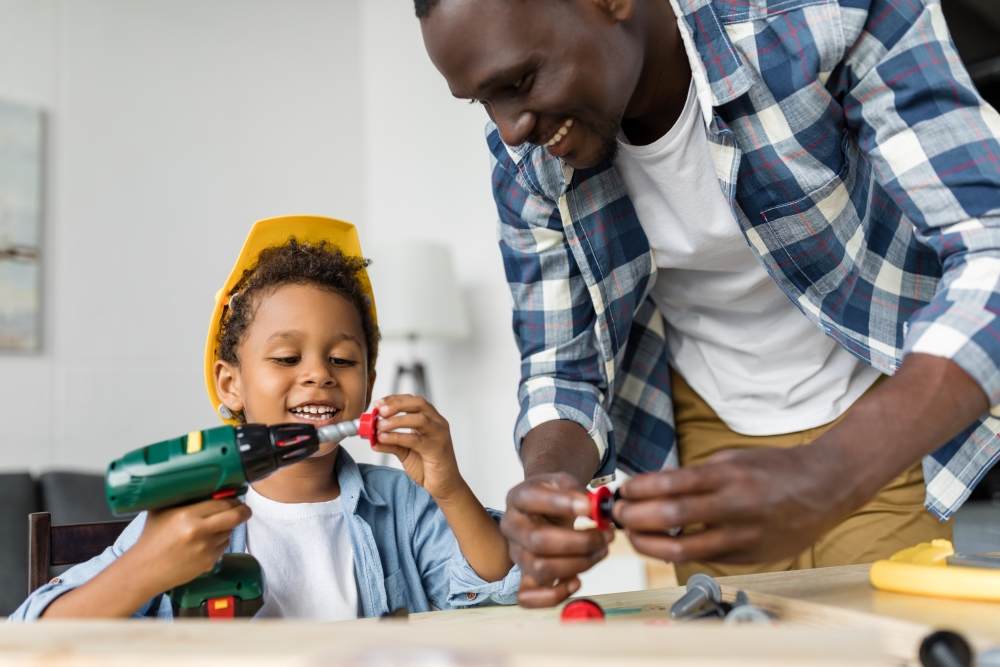As a child, I grew up in a culture and era where dads hardly played with their children and weren’t expected to. Dads playing and showing their goofy, fun side was considered soft. Please understand the dads I knew, including mine, loved their children dearly, but a healthy dose of play was not part of the package.
Back then, expecting your dad to engage in play was like expecting a chicken to fly. Chickens can fly, but you rarely see them flying, and when they do, it’s usually not for long and can be shocking because we are not used to seeing them fly.
Many years later, when I became a dad, my dad shocked me with something he said while I was bathing my 2-year-old son.
My son wasn’t cooperating and had to get ready for daycare. He kept fussing, and we seemed to be getting nowhere. My dad had been watching us the entire time, and after a few minutes of my failed attempts to get my son to take a bath, he said, “He just wants to play. Try playing with him.”
Despite my shock at his statement, I reluctantly began to make funny faces and sounds while tickling him, and the longer we continued, the more my frustration and the tension from earlier melted off. My son relaxed. I relaxed. We were playing, and like a flash, bath time was over.
Play and learning are intertwined. Through play, you learn about yourself, your child, and the people and world around you. Play is a simple joy that’s a cherished part of childhood and adulthood.
As men, play can sometimes be the last thing on our minds for many reasons, such as a packed schedule, physical and mental fatigue, and fear of rejection or ridicule if we try to be lighthearted and playful. You are not alone if you feel this way. I also struggle with self-consciousness and concerns about unleashing my inner child and playfulness. However, consider that children are incredibly creative, always inventing and constantly learning, partly because they have no reservations about play.
If you have ever thought of play as frivolous, here are some helpful benefits to reframe your view of play:
-
Play is connecting time – It enables us to take a break from the hustle and bustle of everyday living to experience and enjoy life with the people we care about in unstructured, fun, imaginative, and creative ways.
-
Play is a stress reliever – When we are playing, we are having fun. It may not be long, but it’s always a good time. It allows our bodies to release natural feel-good chemicals that provide an overall sense of well-being.
-
Play strengthens emotional connections – Playing creates a safe space to explore our emotions and connect with other people on an emotional level. During play, we get the opportunity to experience empathy, trust, and intimacy.
-
Play enhances brain function – Cognitive improvement can come through playing games or other fun activities. Play stimulates the mind, boosts creativity, helps improve your brain’s functionality, and averts memory problems.
3 ways to develop the habit of play:
- Schedule it. Block out some time on your calendar to play with your kids, a friend, or alone. Whatever gets on your calendar usually gets done. Choose a length of time that is sustainable for you. Make it as easy as possible to get started. It could be as little as five minutes. Don’t worry about the outcome. Focus on mastering the art of showing up.
- Do it. You have blocked out time on your calendar but don’t feel like playing. What do you do? Show up! Playing might not feel like the adult thing to do if you have bought into the idea that play is for kids only, especially when you have other things pulling your attention. Just like you don’t feel like going to the gym but do it anyway and feel great after your workout, that’s what happens (minus the burning muscles) when you do it.
- Track it. If being playful doesn’t come naturally, tracking your playtime can help you turn it into a habit. Putting playtime on your calendar protects that time, and tracking is how you record that it got done. There are many tools you can use to achieve this. I use an app from the ios app store called Done. Having a method of recording your playtime enables you to review your progress so you see how well you’re doing, and it can also serve as a motivator to keep you going as you see your progress build up.

